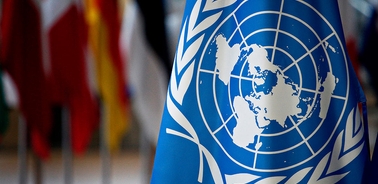- Home
- Our Purpose At Ie University
- Knowledge At Ie University
- Corona Conflict: How The Virus Leads To Violence In The Global South
Corona Conflict: How the Virus Leads to Violence in the Global South

IE's Thomas Kruiper, Professor of International Relations at IEU, considers the consequences of the novel coronavirus beyond the health and economic dimensions and poses the question of what this could mean with regard to the spread of political violence.
by Thomas Kruiper is professor of International Relations at IE University.
On March 23, UN Secretary-General António Guterres called for an immediate global ceasefire, saying the fury of the novel coronavirus illustrates the folly of war. While politically correct, his statement may well turn out to be empirically mistaken. The fact is that the consequences of the pandemic are more likely to spread political violence than to stop it. Rather than laying down their weapons, some might actually use the pandemic as one.
So far, coronavirus coverage in the developing world has focused on the direct consequences of the virus on healthcare systems and economies. The EU has twice as many doctors as Latin America, three times as many as the Middle East, and 15 times as many as sub-Saharan Africa. The Economist has reported that the average American hospital has more respirators and intensive-care beds than some African countries. Kenya has 130 intensive-care beds, Uganda 55, and Malawi only 25. Statistics on respirators are even more alarming.
The economic loss of control might be even more devastating, for citizens and governments alike. The approximately 750 million people living below the poverty line of $1.90 a day won’t be able to sit out a lockdown for more than a few days before going hungry and becoming angry. Governments in the developing world can’t do much to compensate for these losses, either. Export rates across the world are in a slump, as are the prices of the raw materials that their budgets depend on.
National security crisis
The UN Conference on Trade and Development (UNCTAD) has already called for a $2.5 trillion corona crisis package for developing countries, roughly equivalent to the 0.7% ODA commitment that most OECD countries have consistently failed to contribute since it was agreed upon in 2005. This year, however, the stakes are much higher. As John Nkengasong, director of the Africa Centres for Disease Control and Prevention, accurately put it, we should first and foremost consider the spread of COVID-19 as a national security crisis.
Corona lockdowns have already led to societal tensions and police brutality across the Global South. Immigrant workers in India are being forcibly sprayed with bleach, South African police are using rubber bullets against citizens who disobey social distancing measures, and police in the Philippines have trapped lockdown violators in dog cages. As horrible as these excesses may be, they are examples of states exercising control, not yet losing control.
A perfect storm
When governments in the Global South start losing control, the medical and economic crises will create a perfect storm for identity politics and political violence. Academics have consistently found that poverty, economic decline, and inequality are among the highest risk factors for predicting the outbreak of civil war, especially when combined with ethnic or religious tensions.
Whereas hospitals in Italy and Spain are basing decisions about who gets treatment and who doesn’t on medical criteria, the same will not be true of societies with large inequalities, whether economic, religious, or ethnic. In effect, this means governments could use the virus as a tool to weaken the security of societal groups that are already at a political disadvantage. Those on the losing side of the equation might not go down without a fight.
A different meaning
The identity card is already being played in corona hotspots across the world. Iranians were quick to blame Chinese students and workers at the start of the outbreak in the holy city of Qom. In turn, Saudi Arabia and the United Arab Emirates pointed to Shiite minorities who had travelled to Qom, even if most cases were in fact imported from China. On social media, infected Shiites were called out as traitors who should be executed. A similar Twitter storm is gathering around Delhi’s #NizamuddinTerrorists neighbourhood, where Tablighi Jamaat (an Islamic missionary movement) is being blamed for spreading the disease, leading to several incidents of violence and intimidation.
Finally, in ongoing conflicts, COVID-19 might be an even bigger catastrophe. In March, the Syrian health minister publicly praised the army for cleansing the country of “germs” (read: political opposition). Meanwhile, Turkey is being accused of cutting off the water supply in Kurdish-held areas of northern Syria. Israel’s economic blockade of Gaza for now means that the virus has hardly spread there, but once it does, they might also block aid to the region. In that case, Guterres’s claim that “the fury of the virus illustrates the folly of war” will take on a whole different meaning.